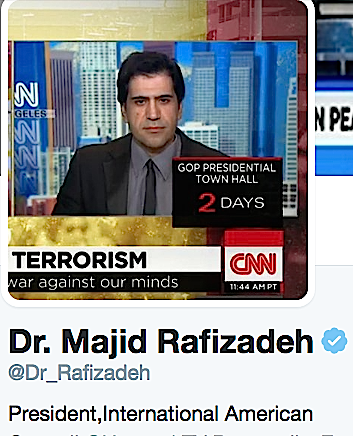Surprisingly, Iran's moderates, who use "softer" tone, have joined other Iranian leaders including the hardliners to criticize US elections and both the Republican and Democratic candidates: Hillary Clinton and Donald Trump.
If the US did similar thing during Iran's presidential elections, Iranian leaders and Ayatollah Khamenei would most likely call the action interference in their domestic affairs by the "Great Satan".
But the question is why Rouhani is lashing out at Clinton who was the Secretary of State under Obama administration and contributed in Iran's nuclear agreement which led to the lifting of economic sanctions?
Iran's moderates are looking for an American president who significantly pivots towards Iran, distance Washington from Iran's rivals, and preferably ignores Iran's geopolitical and strategic ambitions.
Mr Obama significantly shifted Washington's Middle East policy by pivoting towards Iran and moving away from Washington's long-standing regional allies.
The underlying reason behind tensions with Tehran is not the nuclear agreement but their opposition on several key regional issues.
The Obama administration did not completely position itself on the opposite spectrum of Iran when it came to Israel, Saudi Arabia and Syria. This caused relationships between Iran and the US to improve.
What had made Mr Obama and Hassan Rouhani's increasing diplomatic ties possible in the first place was the relative convergence of policies on the three points: one, Mr Obama's lenient position on the nuclear agreement, which led to the lifting of four rounds of sanctions against Iran. Two, his administration increasing tensions with Iran's regional rivals. Three, his soft tone on Iran's proxies.
By criticizing Clinton and Trump, Iranian leaders are sending a signal to the next US president that he/she needs to follow the footsteps of President Obama, that he/she should favor appeasement policies towards Iran, significantly pivot towards Tehran, and take a softer stance on Iran's regional objectives. For Iranian leaders across the political spectrum (moderates, reformists and hardliners), it would be ideal if the character and policies of the next US President resemble that of President Obama.
______________________
Dr. Majid Rafizadeh is a businessman, political scientist, philanthropist, and president of the International American Council on the Middle East. Harvard-educated, Rafizadeh serves on the advisory board of Harvard International Review. He is regularly quoted and invited to speak on national and international outlets including CNN, BBC World TV and Radio, ABC, Aljazeera English, Fox News, CTV, RT, CCTV America, Skynews, CTV, and France 24 International, to name a few. Dr. Rafizadeh is frequently invited to brief governmental and non-governmental organizations as well as speak, as a featured speaker, at security, business, diplomatic, and social events. He has been recipient of several fellowships and scholarships including from Oxford University, Annenberg, University of California Santa Barbara, Fulbright program, to name few. He analyses have appeared on academic and non-academic publications including New York Times International, Los Angeles Times, CNN, Farred zakaria GPS, The Atlantic, Foreign Policy, The Nation, The National. Aljazeera, The Daily Beast, The Nation, Jerusalem Post, The Economic Times, USA Today Yale Journal of International Affairs, Georgetown Journal of International Affairs, and Harvard International Review. He is a board member of several significant and influential international and governmental institutions, and he is native speaker of couple of languages including Persian, English, and Arabic. He also speaks Dari, and can converse in French, Hebrew. More at Harvard.
You can sign up for Dr. Rafizadeh's newsletter for the latest news and analyses on HERE. You can also order his books on HERE.
You can learn more about Dr. Rafizadeh on HERE.
You can contact him at Dr.rafizadeh@post.harvard.edu or follow him at @Dr_Rafizadeh.

